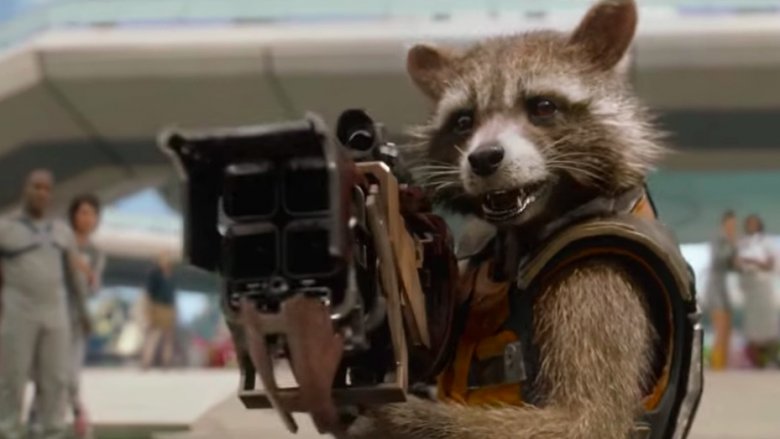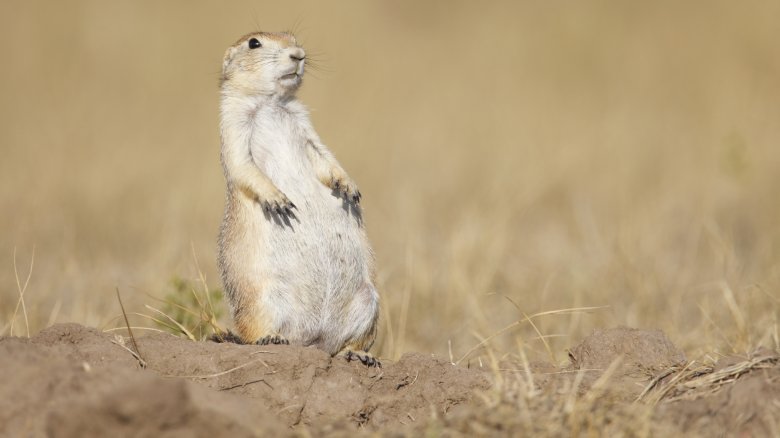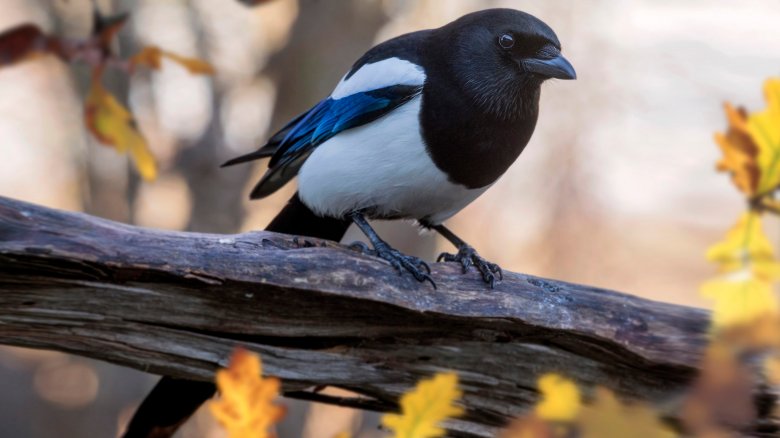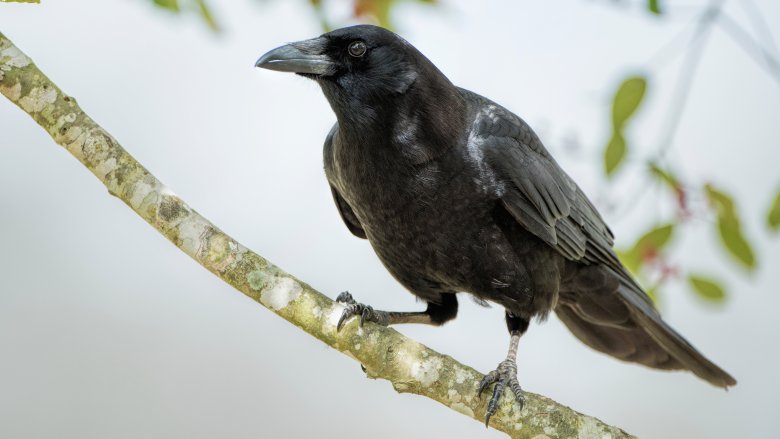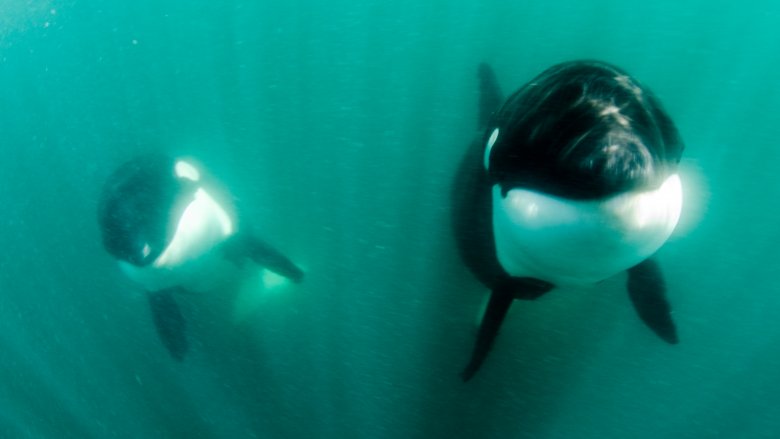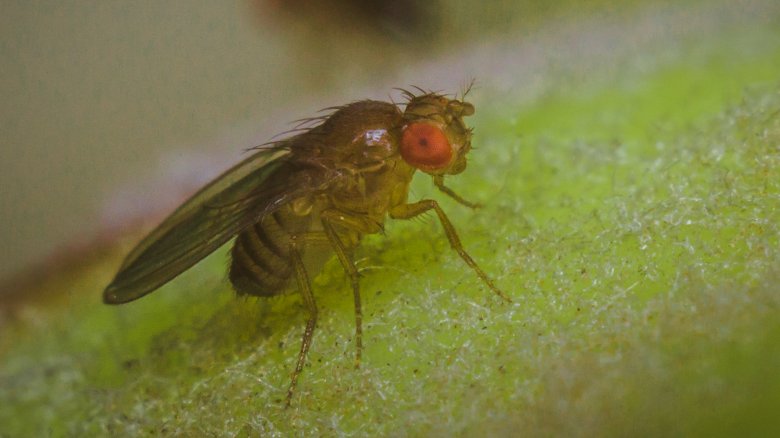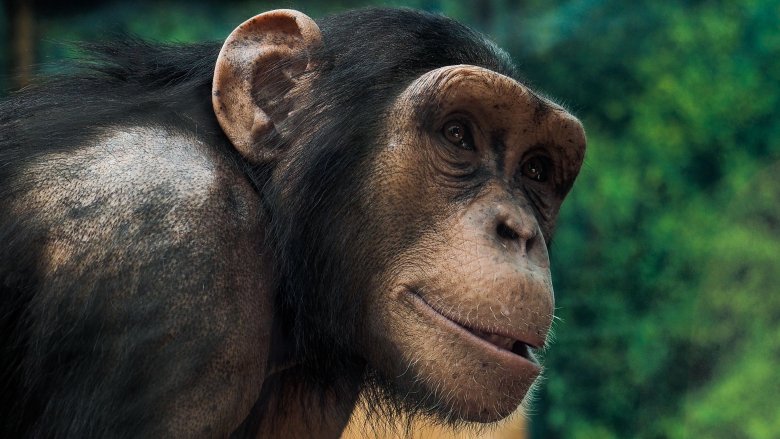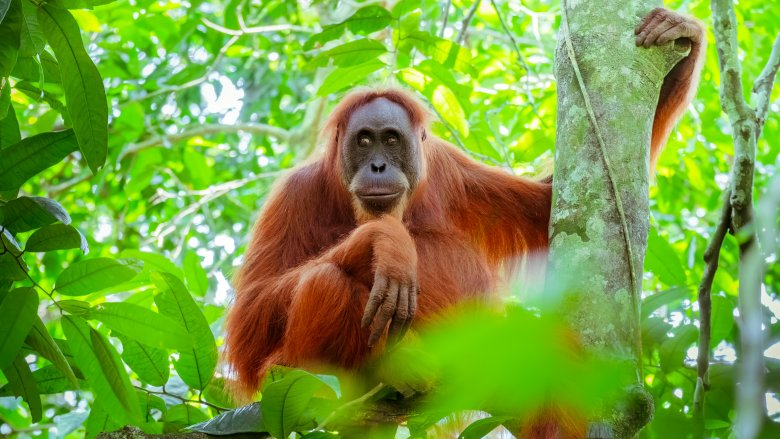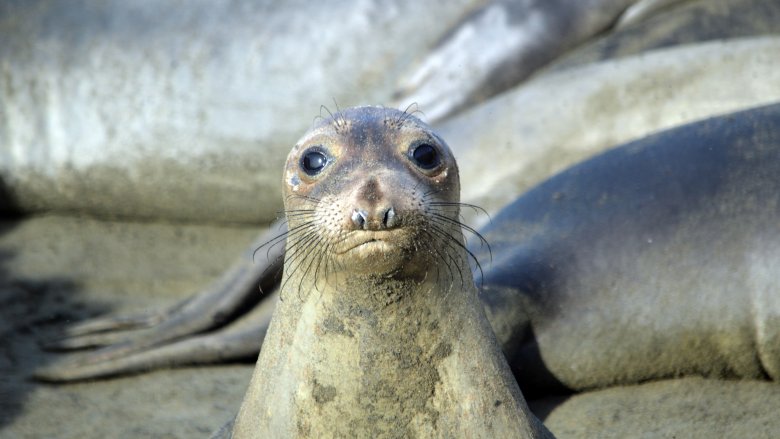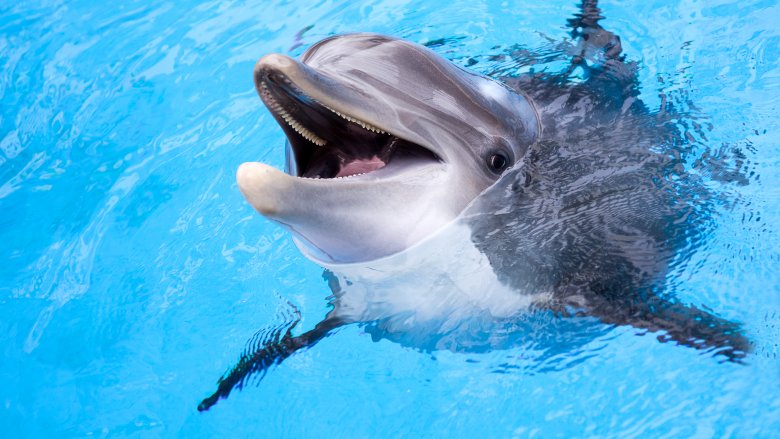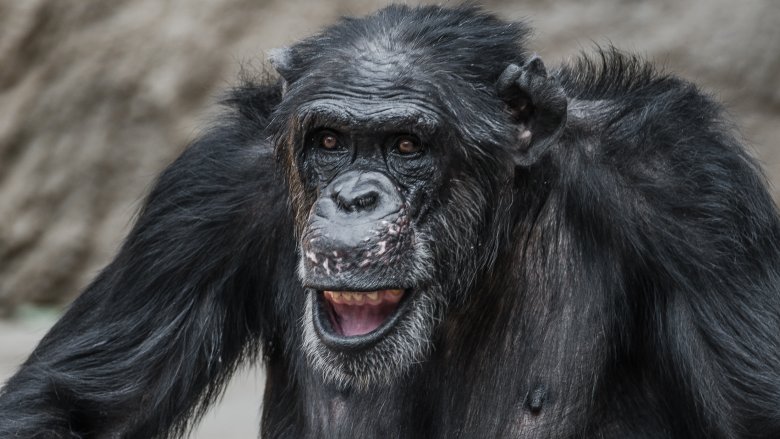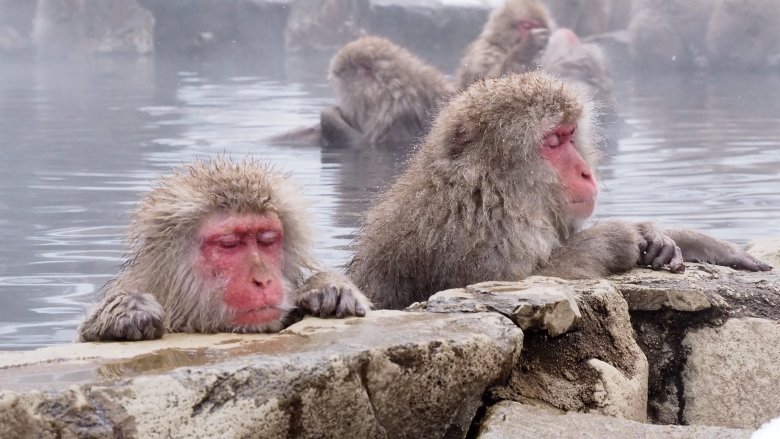Animal Behaviors That Are Eerily Similar To Human Behaviors
For centuries, we human beings have believed that we're better than everyone else. We have qualities that separate us from the lesser creatures, like language, tool-making, and passing out in puddles of our own vomit because we got dumped and drank too much. But as scientists spend more and more time and research dollars trying to discover what makes animals do the things they do, more and more unsettlingly human qualities reveal themselves.
We haven't quite gotten as far as horses who pen their own biographies, rabbits who can see the future, or mercenary trash-pandas. When animals start holding funerals and hiring hit men, though, it becomes a lot more difficult to pretend that we're really all that different from our furry, flippered, and feathered counterparts. Animals (even ones that aren't famous) can do some pretty human-like things, and no matter how hard scientists try to avoid anthropomorphizing, the rest of us can't really help ourselves.
Prairie dogs have language
Prairie dogs are basically just rats, only cuter because of the whole standing-on-their-back-legs thing that they do, right? Well, not exactly. The prairie dog is actually a member of the squirrel family, and since you've almost certainly witnessed the sheer stupidity of a squirrel who attempts to escape an approaching vehicle by running under its wheels, you might be tempted to believe that prairie dogs are just as stupid as their urban counterparts. But the truth is that prairie dogs are actually creepily clever, because they can talk. They don't speak English — yet — but they have a complex language that includes both nouns and adjectives.
According to The New York Times, prairie dogs keep their colonies safe by warning each other about danger. Their calls don't just indicate the approach of a predator, they also let the group know exactly what kind of predator they should look out for. But wait, there's more — a prairie dog also has specific "words" it can use to describe that predator. So instead of just saying "human approaching," the prairie dog can say, "large, fast-moving human wearing purple approaching." Even weirder, prairie dogs can also combine sounds in order to describe something they've never seen before. What's unfortunate is that a prairie dog can't help out a squirrel by yelling, "Look out, a fast-moving red car!" Squirrels, evidently, are still too dumb to speak prairie dog.
Magpies have funerals
It's pretty obvious that animals can feel grief. Dogs mourn their owners and each other, and cats mourn the food they were supposed to get 20 minutes ago but didn't because their human servant tried to sleep in on a Saturday. But one thing that animals don't do is hold funerals. Cats would probably think it's sign of personal weakness.
Actually, some animals do hold funerals, and one startling example of an animal that does this is the humble magpie. According to The Telegraph, magpies have been observed engaging in behavior that not only looks like grief, but also a lot like a memorial service. A magpie that encounters the body of another magpie might approach it and peck at it carefully, as if saying, "Frank! Frank! Wake up!" If the body doesn't respond, the magpie will fly off, and then come back a few minutes later with a few blades of grass, which it will lay next to the body. But researchers haven't just observed a single bird doing this — other magpies will join in the ritual, each one bringing its own offering of grass. Then the magpies will stand next to the body for a little while before flying away.
This behavior has also been observed in crows and ravens, so not only is it not an anomaly, it isn't even a behavior that's confined to a single species. Anthropomorphism rules.
Crows can make their own tools
We used to think that humans were the only species that used tools. Then we learned that other primates use tools, too, and because we needed even more humbling, so do some fish and insects. Clearly, you don't need a large brain and a pair of opposable thumbs to figure out that you can use objects to help you accomplish things. Turns out, we aren't even the only ones who can make tools. Crows use tools, too, and they can also alter them to better meet their needs.
The New Caledonian crow is especially clever — according to The Guardian, scientists have observed these birds fashioning special tools designed to accomplish a specific task. For example, they might bend a twig into a hook that can be used to retrieve food from hard-to-reach places. For a while, scientists thought this skill was hard-wired, but a University of Auckland experiment proved it was more than that. Wild crows were taught to retrieve treats by placing a specific-sized piece of paper into a vending machine. To get the machine to work, the crows had to tear a piece of paper to the correct size without any reference point for the task, which shows that they were capable of thinking about the problem and creating the right tool to solve it. Next, crows will learn how to fashion tiny lock-picking devices so they can break into your garage. Just wait.
Orcas have culture
So, if it isn't language that separates us from our animal counterparts, and it isn't funerary rites, and it isn't tool making, then it must be culture. Surely, no other creature is capable of passing customs and traditions down from one generation to the next, right? Nope. "Orcas have evolved complex culture," says Smithsonian Magazine. Evidently, orcas not only have culture, it's also very important to the way they survive, reproduce, and party. Evidently, orcas also do that. Who knew?
Each orca belongs to a clan, and within those clans exist smaller groups, called pods. And there are vast cultural differences between all of them. The vocalizations of orcas in one clan are so different from those in another that it's practically a distinct language, and between individual pods there will even be differences that amount to dialect. But that's not all — different groups prefer different foods, too. Some eat salmon, others eat seals and porpoises, others eat penguins.
All sorts of behavior vary from pod to pod. Some groups like to scratch their bellies on rocks, others don't, and some have elaborate greeting parties that culminate in what Smithsonian calls a "killer whale mosh pit." These cultural differences are so distinct that some pods' populations are threatened by inbreeding, because evidently whales outside the pod are afraid to be seen with those bizarro whales from that other pod. Not only is culture not limited to human beings, but racism doesn't seem to be, either.
Male fruit flies get drunk after being rejected by the opposite sex
At human drinking establishments, there's usually at least one dude drowning his sorrows in a glass of scotch. Now, we wouldn't want to stereotype or anything, but a common theme for those lonely, drunken evenings seems to be romantic rejection. It may be pathetic, but at least it's something that separates humans from animals, right? Wrong! In fact, it doesn't even separate humans from fruit flies. Yes, according to National Geographic, a male fruit fly who has not been successful in finding a mate will seek out food that contains alcohol. Males who did find a mate, meanwhile, are perfectly happy hanging out at the barbecue with a bottle of O'Douls.
In case you're wondering where fruit flies find alcohol, it's present in just about every rotting, fermenting piece of fruit you leave sitting out on your countertop, which is why fruit flies always seem to find their way to that part of your house. Scientists think the rejected male fruit flies seek out the fruit with the higher alcohol content because they're looking for some sort of reward that they weren't able achieve when courting the ladies. As it turns out, alcohol is also useful to fruit flies in other ways — females will lay their eggs in fermenting fruit to protect them from predatory wasps, who don't have the same love of alcohol (it's toxic to the teetotaling wasps).
Chimpanzees hunt with spears
Chimpanzees are smart. They're also evil, but that's a whole other conversation. According to IFLScience, chimpanzees not only eat people's faces, they also use tools to break open nuts, and some of them even use tools for hunting.
This behavior has been observed in a troop of chimpanzees living in Senegal. Like those New Caledonian crows, these particular chimps don't just pick up random objects and use them to bludgeon their prey, they actually design the weapons to serve a specific purpose. Scientists have seen the chimps breaking off branches, removing the leaves, and then sharpening the ends with their teeth. They then use their crude spears to stab sleeping bush babies, thus proving that they are not only clever hunters but also just as evil as we thought they were.
So far, scientists have only seen this behavior in the chimps of this one particular troop, so we might actually be witnessing an evolutionary process similar to what happened when our own ancestors started hunting with weapons. It's fascinating, to be sure, but what scientists seem to be missing is that it's also terrifying. Let's just carefully spell it out: chimps can make weapons. Chimps like to eat people's faces. Next up, Planet of the Apes.
An orangutan hired a contract killer and paid him with sex
We've established that chimpanzees are evil, but as it turns out, evil is not just confined to humans and their closest cousins. Orangutans can be evil, too. In fact, they are capable of premeditated murder.
Now, premeditated killings are not really that weird in the animal kingdom. After all, every pack of wolves that sets out with the intention of hunting and eating a caribou is engaging in a premeditated killing. But what is weird is when it's done within a species, especially when the killing appears not only planned, but coordinated.
According to Scientific American, in 2016 researchers witnessed the murder of a female orangutan by a younger female and her male accomplice. What made the incident bizarre wasn't just the fact that female orangutans are hardly ever aggressive, but that the female appeared to be using the male as a hit man. The two females were evidently rivals, and the younger one seems to have convinced her male partner to attack the older one by withholding romance. The pair ended up killing the older female.
To a casual observer, it sure looks like the female traded sex for murder, but researchers don't really know. Orangutans, like so many other species, have to compete for resources, and resources are increasingly scarce. Orangutan-on-orangutan violence is still pretty rare, so we probably shouldn't interpret this as another sign of the rise of the Planet of the Apes. Probably.
Seals adopt orphaned babies
All creatures are endowed with survival instincts, from the ability to recognize danger to the drive to cover ourselves in a layer of insulating blubber by eating brownies and cheeseburgers. But the most significant survival instinct that animals have is the desire to be a parent. Since our lives are temporary, the most important thing we can do — at least as far as nature is concerned — is pass our genes along to the next generation.
That parenting instinct is so strong that some animals will readily adopt and care for the offspring of other animals, sometimes even animals from other species. That's because nature has programmed parents with an insatiable desire to care for things that are helpless and cute, and that desire is so strong that it transcends actual genetics.
According to the BBC, northern elephant seals raise their young on crowded beaches, and babies are sometimes separated from their parents. Often, orphaned seals are adopted by females who have lost their own pups, but sometimes they are even adopted by females who have never had pups of their own. Adoption has also been observed in some species of bird, as well as in primates. Occasionally, animals will adopt outside their own species — it happens most often in captivity, but in 2004, researchers saw it happen in the wild, too, when a group of Capuchin monkeys adopted a much smaller, much more adorable marmoset. Let's just call it "survival of the cutest."
Dolphins can be heroic
Sailors have been telling stories about the heroism of dolphins for centuries. Most people thought it was bunk, because sailors have also been telling stories about mermaids, the kraken, and Davy Jones' locker for centuries, and most listeners learned how to smile and nod and pretend like those sailors weren't just really in need of a career change.
If you look back, though, the heroism of dolphins is a pretty common theme, from the writings of ancient Greeks to modern stories in which dolphins go out of their way, for whatever reason, to save the lives of human beings. According to Real Clear Science, in two fairly recent incidents, dolphins defended surfers from great white sharks. In another story, a teenage boy fell out of a boat and was pushed to safety by a dolphin. In 2012, a marine biologist described a pod of dolphins that helped rescue a suicidal girl.
We know that dolphins aren't the only animals capable of acts of altruism — many a collie has pulled many a boy named Timmy from many a well, metaphorically speaking. Dogs have something to gain from that altruism, though (namely, pets and extra kibble). What does a gorilla have to gain from saving a three-year-old boy who fell into her enclosure? Empathy, it seems, is also not strictly a human characteristic.
Chimpanzees will laugh politely at lame jokes
Chimpanzees may be evil, but they do have at least one quality that some humans haven't mastered: the ability to laugh politely at someone's lame joke. The fact that chimpanzees can laugh isn't actually as weird as it seems. Lots of animals laugh — a recent study even found that rats will make a giggling, chirping sound when tickled. This is fascinating, not just because you probably never imagined that a rat could laugh, but also because you never imagined that anyone would fund a study in which humans tickle rats as a matter of scientific inquiry.
A study at the University of Portsmouth found that chimpanzees have two different styles of laughter — spontaneous, and laugh-elicited. The two have distinct sounds, much like the way the belly laugh you experience while watching The Life of Brian differs from the "heh heh" you force yourself to emit when your co-worker mangles a joke he heard on Saturday Night Live. Researchers think the laugh-elicited laughter, which is triggered by the laughter of other chimps, is a strategy for maintaining social interaction.
So, you can think of it like this — when you're with your friends and someone tells a joke, and everyone thinks it's funny but you, what do you do? If you don't laugh, it changes the whole mood of the evening. If you do laugh, your friends buy another round. We aren't so different from chimps after all... except we're way less evil.
Snow monkeys take a hot bath to relieve stress
What do you do to unwind after a long, hard day at the office? If you said, "take a hot bath," you're in good company, because so did about a billion other people, and also this weird species of Japanese monkeys. According to The Japan Times, snow monkeys live in a cold climate, and they spend a lot of time bathing in natural hot springs. The reasons why seem pretty obvious — it's cold, Japanese snow monkeys don't have heated bathroom floors, and their butts are naked. But it turns out there's another advantage to a regular hot bath, which probably won't surprise you — bathing reduces the snow monkey's stress level by around 20 percent.
How do researchers know this? They found that monkeys that bathe regularly had lower levels of the stress hormone cortisol than monkeys that didn't bathe at all. And to arrive at that conclusion, all they had to do was wait for the monkeys to poop, run out and pick it up, then poke around in it in search of evidence. Pretty revealing, right? Well, not because of the monkey-stress-bath-thing, necessarily, but because now we finally know what it is that separates humans from animals. It's the fact that we're so ridiculously curious about the world that we will happily dig through another animal's excrement in search of answers. We can all rest easy with the knowledge that there are no other animals on planet Earth that do that.
